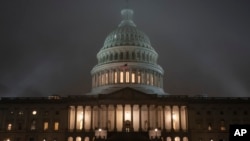ຫຼາຍກວ່ານຶ່ງອາທິດຫຼັງຈາກບັນດາສະມາຊິກສະພາຕ່ຳ ສະຫະລັດ ໄດ້ຟ້ອງຮ້ອງປະ
ທານາທິບໍດີ ດໍໂນລ ທຣຳ ໃນຂໍ້ຫາໃຊ້ອຳນາດໄປໃນທາງຜິດ ແລະຂັດຂວາງສະພາ
ນັ້ນ ສະພາສູງຍັງຕົກຢູ່ໃນສະພາບບໍ່ໄປບໍ່ມາ ກ່ຽວກັບວ່າ ຈະດຳເນີນຄະດີຢ່າງໃດ.
ໃນຂະນະທີ່ຜູ້ນຳສຽງສ່ວນຫຼາຍຂອງສະພາສູງ ທ່ານມິດຈ໌ ແມັກຄອນແນລ ຈາກລັດ
ເຄັນຕັກກີ ກ່າວວ່າ ທ່ານຕ້ອງການຈະເລີ້ມດຳເນີນຄະດີໃນບໍ່ຊ້າ ຫຼັງຈາກບັນດາສະ
ມາຊິກສະພາ ກັບຄືນມາ ຈາກການພັກເພື່ອສະຫຼອງບຸນໃນເດືອນມັງກອນ ແຕ່ສະ
ມາຊິກພັກເດໂມແຄຣັດກຳລັງຮຽກຮ້ອງໃຫ້ມີການຕົກລົງລ່ວງໜ້າເພື່ອອອກການ
ໝາຍເກາະ ຮຽກໂຕບັນດາພິຍານ ແລະເອົາເອກກະສານໃນລະຫວ່າງການດຳ
ເນີນຄະດີ.
ໃນການໂຕ້ຖຽງກ່ຽວກັບວ່າ ຈະເຄື່ອນໄຫວໄປຕໍ່ໄປແບບໃດນັ້ນ ທັງສອງຝ່າຍຕ່າງ
ກໍໃຫ້ຂໍ້ສັງເກດກ່ຽວກັບການດຳເນີນຄະດີໃນປີ 1999 ຕໍ່ອະດີດປະທານາທິບໍດີບິລ
ຄລິນຕັນ ໂດຍກ່າວຫາຊຶ່ງກັນແລະກັນວ່າ ບໍ່ໄດ້ເຮັດຕາມໃນອັນທີເຂົາເຈົ້າເຫັນວ່າ
ໄດ້ຕັ້ງໄວ້ກ່ອນແລ້ວໃນການດຳເນີນຄະດີນັ້ນ ແລະສະມາຊິກສະພາຕ່ຳພັກເດໂມ
ແຄຣັດກໍພາກັນໂກດແຄ້ນ ກ່ຽວກັບການປະກາດຂອງທ່ານແມັກຄອນແນລ ທີ່ຈະ
ປະສານງານການດຳເນີນຄະດີ ຮ່ວມກັບທຳນຽບຂາວ ແລະທຳທຸກສິ່ງທີ່ທ່ານສາ
ມາດໄດ້ ເພື່ອບໍ່ໃຫ້ທ່ານທຣຳມີຄວາມຜິດ.
ໂດຍເອີ້ນການຟ້ອງຮ້ອງວ່າ “ຂັ້ນຕອນທາງການເມືອງ” ນັ້ນ ທ່ານແມັກຄອນແນລ
ໄດ້ກ່າວວ່າ ທ່ານຈະບໍ່ເປັນ “ຄະນະຕຸລາການທີ່ທ່ຽງທຳ.” ເລື້ອງນີ້ ບັນດາຜູ້ຕຳນິ
ກ່າວວ່າ ແມ່ນຂັດກັບການສາບານໂຕໃນການບໍ່ເຂົ້າຂ້າງອອກຂາ ທີ່ບັນດາສະມາ
ຊິກສະພາສູງທັງໝົດຕ້ອງໄດ້ເຮັດ ກ່ອນການດຳເນີນຄະດີເລີ້ມຂຶ້ນ.
ເພື່ອເປັນການເລີ້ມ ການດຳເນີນຄະດີຢ່າງເປັນທາງການນັ້ນ ສະມາຊິກສະພາສູງ
100 ຄົນຕ້ອງໄດ້ຮັບຜ່ານຍັດຕິ ດ້ວຍຄະແນນສຽງສ່ວນຫຼາຍ. ແຕ່ວ່າເພື່ອຈະດຳ
ເນີນການດັ່ງກ່າວນັ້ນໄດ້ ສະພາຕ່ຳກ່ ອນອື່ນໝົດຕ້ອງສົ່ງສຳນວນຟ້ອງໄປໃຫ້ສະ
ພາສູງ.
ປະທານສະພາຕ່ຳ ທ່ານນາງແນນຊີ ເພໂລຊີ ຈາກລັດຄາລີຟໍເນຍ ເຖິງ່ຢາງໃດກໍດີ
ກ່າວວ່າ ທ່ານນາງປະຕິເສດທີ່ຈະສົ່ງເອກກະສານໄປໃຫ້ ແລະເລືອກບັນດາໄອຍະ
ການ “ຈົນກວ່າວ່າພວກເຮົາຮູ້ວ່າ ເປັນການດຳເນີນຄະດີຢ່າງໃດທີ່ສະພາສູງຈະເຮັດ.”
ທ່ານແມັກຄອນແນລ ປະຕິເສດທີ່ຈະຕົກລົງເຫັນພ້ອມໃດໆລ່ວງໜ້າ ແລະໃຫ້ກ່າວ
ອ້າງເຖິງການດຳເນີນຄະດີທ່ານຄລິນຕັນ ໃນປີ 1999 ວ່າໄດ້ມີມາກ່ອນແລ້ວ.
More than a week after the U.S. House of Representatives impeached President Donald Trump on charges of abuse of power and obstruction of Congress, the Senate remains deadlocked over how to proceed with a trial.
While Senate Majority leader Mitch McConnell of Kentucky says he wants to start the trial as soon as lawmakers return from the holiday recess in January, Democrats are demanding an agreement in advance to subpoena witnesses and documents during the proceeding.
In sparring over how to move forward, both sides are invoking the 1999 impeachment trial of former President Bill Clinton, accusing each other of departing from what they view as precedents set by that trial. And Congressional Democrats are outraged over McConnell's vow to coordinate the trial in lockstep with the White House and do everything he can to acquit Trump.
Calling impeachment a "political process," McConnell has said he won't be an "impartial juror." This, critics say, flies in the face of an oath of impartiality that all senators must take before the trial begins.
To formally launch a trial, the 100-member Senate must pass a resolution with a simple majority authorizing the proceeding. But in order to do that, the House must first transmit the articles of impeachment.
House Speaker Nancy Pelosi of California, however, says she refuses to deliver the documents and select impeachment prosecutors "until we know what sort of trial the Senate will conduct." McConnell is refusing to agree to any of that in advance and cites the 1999 Clinton trial as a precedent.










